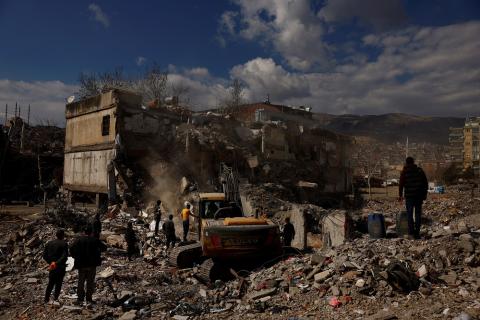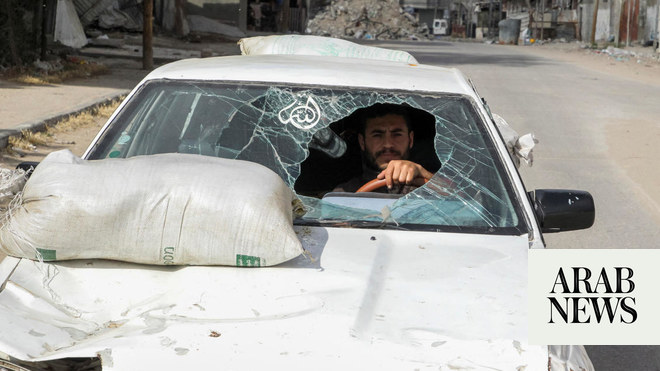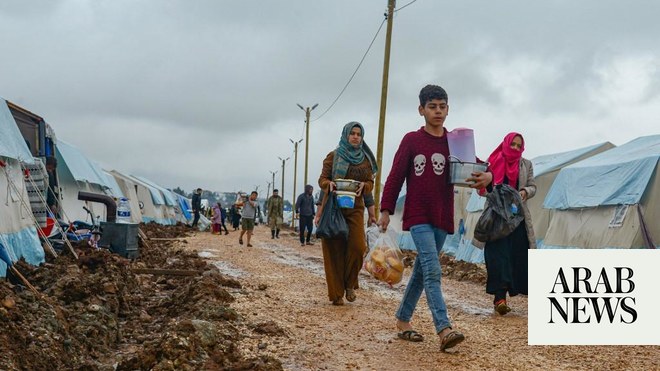
International donors pledged on Wednesday $4.4 billion dollars for Syrian civilians suffering from their country’s crisis, a figure that fell well short of a projected target of $9 billion.
The head of the UN aid agency UNOCHA called the $4.4 billion "a good start" but a group of nine international aid organizations said the conference "did not go nearly far enough".
The sum committed at a two-day conference in Brussels was less than half of the $9 billion the United Nations says is needed this year to help those in need inside Syria and living as refugees in neighboring countries.
"My best guess is that by the end of the day we will have heard pledges for 2018 of $4.4 billion," Mark Lowcock, the head of UNOCHA, told a news conference.
He added that pledges of a further $3.3 billion for 2019 and after were expected at the conference, attended by more than 80 countries, aid groups and agencies.
Britain announced 450 million pounds ($630 million, 515 million euros) for 2018 and another 300 million pounds for 2019, while Germany said it would donate more than a billion euros and the EU pledged some 560 million euros.
But several major donors including the United States have not yet confirmed their pledges, Lowcock said, because of ongoing internal budget wrangling.
The figure was also well short of the $6 billion pledged at last years Brussels gathering, and a group of nine NGOs including Oxfam, Save the Children and the Norwegian Refugee Council issued a joint statement to voice their alarm.
"This conference did not go nearly far enough to provide adequate support to the millions of Syrians in need of assistance and who are left facing an uncertain future," they said.
Some 6.1 million people are now internally displaced in Syria, more than five million have fled the country and 13 million including six million children are in need of aid, according to the UN.
More than 700,000 people have been displaced since the start of this year alone as Assad has stepped up his offensive against rebel forces, intensifying the humanitarian crisis.
Humanitarian aid is also set to go to Lebanon, Jordan, Iraq and other countries overwhelmed with some six million Syrian refugees. Refugees in Lebanon makes up a quarter of the country’s population.
The failure to reach the UN goal at the pledging conference showed the challenge for Syria as other conflicts, from Afghanistan to Myanmar, also demand attention and money.
Achim Steiner, head of the UN Development Program, told Reuters there was a risk of so-called donor fatigue because of the sheer length of the multi-sided war.
“It is a natural phenomenon as the conflict continues year after year,” Steiner said. “In 2018, the humanitarian drama ... is actually at its peak.”
UN Syria envoy Staffan de Mistura on Tuesday urged the international community not to allow a new humanitarian catastrophe to unfold in the rebel-held northwestern province of Idlib, on the Turkish border, which has seen a massive influx of people fleeing the conflict.
Europe hoped to use the conference to reinvigorate the faltering UN-led peace process in Geneva, but it was not clear how effective the push was.
"We need in particular Russia, Iran to exercise pressure on Damascus so that it accepts to sit at the table under UN auspices," EU diplomatic chief Federica Mogherini said as she arrived for the gathering, the seventh of its kind.
Earlier, the UN warned that two weeks after its forces took full control of Eastern Ghouta, the regime has yet to allow UN humanitarian aid to enter the main town of Douma.
UN deputy aid chief Ursula Mueller also told the UN Security Council that the situation in rebel-held Idlib was "catastrophic" with tens of thousands of displaced Syrians from Eastern Ghouta and elsewhere seeking refuge there.
About 70,000 people are in dire need of aid in Douma after one of the most intense military battles in Syrias seven-year war. The regime retook full control of Eastern Ghouta on April 12.
"After seven years of conflict that continues to see escalation after escalation, the needs of Syrians have never been higher," said Mueller, the UN assistant secretary-general for humanitarian affairs.
With almost 400,000 people displaced since mid-December and tens of thousands pouring in from other regions, Idlib has also been hit by air strikes in recent weeks as fighting continues, Mueller said.












